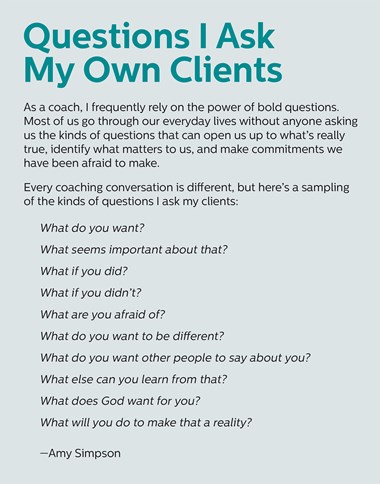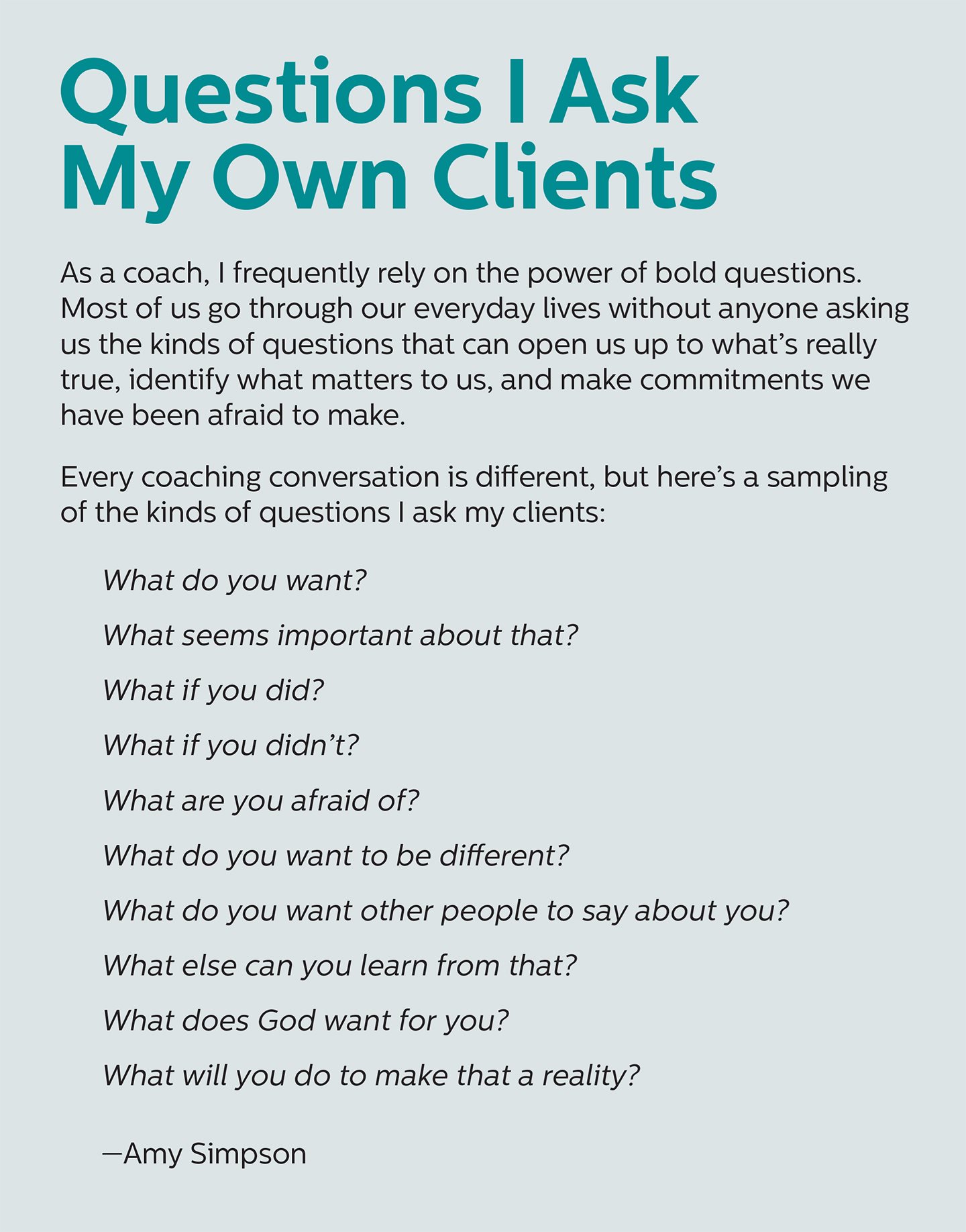Want to Live Fearlessly?

A year and a half ago, Shannon Miller was feeling trapped in her teaching career. “I was unfulfilled, but I didn’t feel like I had a lot of other options for what I could do.” She noticed that she often found herself in situations that called for her to lead others—but she had never thought of herself as a leader, and she didn’t know what she might have to offer in that capacity. She was ready to explore a new way of looking at herself.
Today Shannon is a confident and fulfilled leader, and she brims with excitement as she talks about the nonprofit organization she has established called Through the Clouds Family Care. Through this organization, Shannon provides much-needed services for families with special
needs. “This is so clearly what God has for me,” she says. “It’s so fulfilling and exciting. This will have a ripple effect over my whole life.”
How did Shannon move from an unfulfilled and tentative leader to the confident and purposeful founder of a non-profit organization in just 18 months? She hired a professional Christian coach.
Shannon spent a couple months in weekly sessions with her coach, Julie Pierce, and participated in Pierce’s leadership training program. “Coaching completely changed my life,” she says. “My coach helped me recognize that I am a leader, and I do bring something to the table.” Her coach also helped her consider other career options and supported her as she found the courage to move forward in pursuing what God was calling her to do: establish the non-profit organization she had dreamed about, but never imagined she could actually start. Her coach helped her see possibilities where she had seen obstacles. “She helped me take the word can’t out of that dream and opened me up to see that the barriers I thought were keeping me from pursuing the dream were not walls; they were little tiny speed bumps to hop over.”
A growing field
Shannon is just one of many thousands who have benefited from the services offered in this growing field. Coaching is considered the second-fastest-growing industry in the world, only behind information technology. In one study, coaching clients indicated that their most significant motivations for seeking coaching were issues with self-esteem/self-confidence and work/life balance. Some other major motivations were related to career options, business management, and relationships. According to the International Coach Federation, 99 percent of people who have hired coaches have been satisfied with their experience.
There’s a reason for the growth in coaching: success stories abound. And it makes perfect sense. Coaching offers things we all need: a listening ear, an objective voice, an ally, someone with whom we can be honest, the experience of being known, a personal challenge, and reminders of why we are here. The foundation of coaching is the power of intentional human relationship, and coaches use helpful tools that draw people out of their well-worn habits and thought patterns. A successful coaching relationship can point people back toward what’s really important to them and nudge them back onto the path they should be traveling. It can dislodge people from places where they have become stuck. It can give them the courage they need to face and question the faulty beliefs that are running their lives. A good coach is one who isn’t afraid to ask hard questions and won’t let a client get away with sticking to easy answers. This determination, coupled with the coach’s more objective viewpoint, can quickly help a person see what she’s been looking past or refusing to see and learn from it.
“Now, whenever I have a really tough day or frustrating season at work, I don’t necessarily want to cut and run like I did before,” says Amanda Robinson, who hired a coach to help her sort through a career-related crisis and develop a better understanding of her own strengths. “Coaching has given me tools to look at the situation differently. Before, I was all over the place. Now I can say, ‘This is a bad day, not a bad job; a bad teammate, not a bad career choice.’ I can work through it.”
Coaching is not . . .
For many people, coaching is often confused with two other professions: consulting and therapy. But coaching is a distinct process.
Consulting involves gathering as much detailed information as possible, synthesizing and analyzing that data, and making recommendations. People who hire consultants can expect well-processed advice from experts. Coaching, on the other hand, does not emphasize gathering information but emphasizes relationship and co-learning. Well-qualified coaches do not give advice; instead, they help clients discover their own solutions and develop their own strategies.
Therapy is a process focused on healing and treating areas of life in which people are not functioning optimally. Therapy has medical components and benefits, which make it very different from coaching. Therapists use tools to delve deeper and more aggressively into a person’s life—especially those places that may be hidden even from the person’s own view. While coaching can be therapeutic in its benefits, coaching is a much different process that is not focused on healing, fixing, or treating anything, and it is not a substitute for therapy. Instead, it is focused on helping people raise the level of effectiveness, fulfillment, and purpose in the chosen areas of life where they already are capable of functioning at a high level.
Things to know about coaching
Coaches tend to find a niche and a working style that best fits them and their clients. Coaches work with clients in-person or over the phone, and clients may be scattered around the country or even the world. Some coaches ask for a minimum time commitment from new clients, and they typically meet with each client two to four times per month. While people often seek coaching because they want to focus on a specific area of life, the relationship may touch on every area of life. Clients can also expect complete confidentiality from coaches. Many coaches offer a free sample session that allows prospective clients to see what the coaching experience is like and consider whether they like a particular coach’s style before signing on.

For anyone considering hiring a coach, it’s valuable to know that coaching is an industry without mandatory regulation, so not all coaches have formal training or qualifications. In fact, one study by the International Coach Federation found that only 51 percent of people who call themselves coaches hold any coaching credential. Among those who do have credentials, many training programs and philosophies are represented. The most closely scrutinized and reputable programs are those endorsed by the International Coaching Federation or the International Association of Coaching.
Christian coaching
Some training programs are specifically Christian in nature, and many coaches, regardless of training, offer coaching from a Christian perspective. Because the coaching process is so closely connected with a person’s understanding of purpose, meaning, and calling, spiritual matters are likely to be part of the discussion. Although any good coach should respect and esteem the faith of her clients, Christians can benefit from working with a coach who shares their beliefs and will offer support from the same perspective.
Coaching can also have spiritual benefits. Amanda says coaching had a “really, really great” effect on her spiritual life. Shannon speaks of an increased trust in God as a result of her coaching experience: “I trust God infinitely more than I did before. I’m trusting him more every day to provide what I need and help me do what he has called me to do.” Part of this benefit, she says, came through a better understanding who God had made her to be: “When you don’t fully understand who you are, or you’re not using the gifts God has given you and doing what he has given you to do, it has an impact on your relationship with God.” Having that understanding “makes all the difference.”
If you think you might benefit from a professional relationship that helps you move from where you are to where you want to be, consider hiring a coach. In the words of Shannon, “To anyone who says, ‘I feel like there might be more,’ I tell them to do coaching. It’s so helpful to have an outside person who is trained guiding you through the process of figuring out who you are and what you want to do.”
Amy Simpson is editor of Christianity Today’s Gifted for Leadership, Senior Editor of Leadership Journal, a speaker, and a Co-Active personal and professional coach. She’s also author of the award-winning Troubled Minds: Mental Illness and the Church’s Mission (InterVarsity Press). You can find her at AmySimpsonOnline.com and on Twitter @aresimpson.
Read more articles that highlight writing by Christian women at ChristianityToday.com/Women
 Read These Next
Read These Next



 I Want to Get Married . . . But I Don’t Want to DateHow having a good life can lead to a tough time finding a husband.
I Want to Get Married . . . But I Don’t Want to DateHow having a good life can lead to a tough time finding a husband.








 Homepage
Homepage

